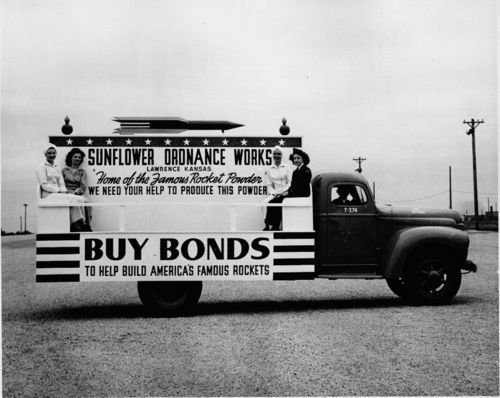
Photo courtesy of Kansas Historical Society
BY ELAINE GIESSEL, Kansas Chapter Chair
Cleaning Up Sunflower Site
As a member of the Kanza Group, I represented the Sierra Club Kansas Chapter on a now defunct advisory board for the remediation and redevelopment of the former Sunflower Army Ammunition Plant (SFAAP) in Johnson County, which was built in 1941 and active from World War II to the Vietnam War.
At one time, the Shawnee Tribe of Oklahoma sought to reclaim Sunflower, which had been part of its 19th-century reservation lands. Federal judges rejected the claim. In 2005, the 9,000+ acre site was declared excess federal property and the majority transferred to Sunflower Redevelopment, LLC (SRL). See KC Q - Sunflower Ammo | Kansas City Public Library for more background and photos. Some of the property was conveyed to Kansas State University and the University of Kansas for research purposes. Once the clean-up is complete, about 2,000 acres will be transferred to Johnson County Park and Recreation District. Recently, the nearby city of DeSoto annexed 6,000 acres of the site.
The U.S. Army continues to work on decontamination of explosive residues and environmental remediation. Of 92 recognized contaminated sites, 71 are still in various stages of clean up. The target date for disposal of all contaminated foundations, sewers and soils is 2028, after which groundwater contamination will be addressed. SRL is responsible for removal of materials and buildings not contaminated with explosive residues.
If there is enough interest, the Army will form a new Restoration Advisory Board (RAB) to provide input on the final remediation efforts. Members would include a balance of representatives from the U.S. Army, SRL, the regulatory agencies, special interest groups, regional elected officials, and local citizens. To volunteer, contact Scott Smith, Project Manager of SFAAP: scott.e.smith138.civ@army.mil or call 913-948-9615.
Panasonic to Build Factory in DeSoto - Reducing Environmental Impacts:
Governor Kelly recently announced that Panasonic will build a large electric vehicle battery manufacturing facility on a part of SFAAP that has been successfully cleaned up and annexed by DeSoto. This is an opportunity to create a model of sustainability by focusing on all aspects of redevelopment of the site: economy, environment, and community.
Building sustainability and community resilience
- Community infrastructure: Planners must consider now how to address the increased needs in western Johnson County for affordable housing, public schools, day care, social services, recreational areas, and health care facilities for an influx of workers.
- Traffic on K-10: KDOT and local planners must minimize the impacts of increased traffic on K-10, particularly at peak hours, to increase safety, protect air quality, and reduce carbon emissions. Panasonic should help develop electric vehicle public transit to commuters in nearby “workshed” communities and to promote carpooling. Creation of on-site affordable housing would reduce vehicle miles traveled to work. A feature of the former ammunition plant was the on-site Sunflower Village which housed as many as 5,000 employees.
- Workforce: Focus on hiring local union members, on providing liveable wages and decent benefits, and on using minority-owned businesses.
- Carbon emissions: Set a goal of Zero Emissions. Develop on-site utility scale renewable energy sources (wind and solar) and storage capacity, especially on “brown fields” not cleaned up to residential standards, and/or distributive generation on all rooftops (carports, parking garages, warehousing, manufacturing, housing). On-site production will reduce transmission losses. Excess energy production and storage would encourage more economic development.
- LEED construction: Set a goal of Net Zero Energy for buildings. Design buildings to be energy efficient and to incorporate reusable materials based on LEED standards.
- Recycling: Set a goal of Zero Waste on-site. In addition to promoting reuse, recycling, and on-site composting of solid wastes, include EV battery recycling/reuse as part of the “circular” economy; avoid mining for raw materials.
- Stormwater runoff: Commit to using Green Infrastructure design to capture surface water and to reduce runoff. Use recognized best management practices to prevent erosion and protect adjacent streamways, both during construction and operations.
- Wildlife habitat: Use stormwater to help replace lost surface water features. Protect and restore woodland, prairie and riparian wildlife habitats which will also maximize carbon sequestration.
- Recreation: Support public access to and enjoyment of the park lands to be developed around the margins of SFAAP; plan with JCPRD to promote healthy and safe recreation for everyone.